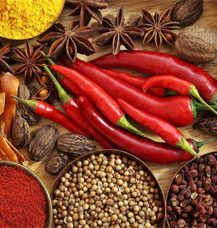Spices exports

JKP Exports Leading EXPORTER of INDIAN SPICES, BASMATI AND NON-BASMATI RICE, OILSEEDS, SUGAR, ANIMAL FEED AND BIRD FEED, that have set a benchmark with exemplary quality. Our knowledge and experience of procurement along with advance technique in manufacturing ensures that our products are of highest quality standards and hence we are considered to be the leading Exporter of Superior Indian Products.We are located at Mumbai, the Financial Hub of India, which helps us to supply and deliver Indian Spices, Pulses and other products in much quicker time then compared to our competitors.
India is known as the home of spices and boasts of a long history of trading with the ancient civilisations of Rome and China. Indian spices are the most sought-after globally, given their exquisite aroma, texture and taste. India has the largest domestic market for spices in the world.
Of the 109 varieties of spices listed by the International Organisation for Standardisation (ISO), the country produces more than 65. The varying climatic conditions in India provide ample scope for the cultivation of a variety of spices. Almost all Indian states produce spices, with the total area under spice cultivation pegged at around 3.15 million hectares.
India commands a formidable position in world spice trade.
Major consuming countries of Indian spices like America and members of the EU have strict quality compliance norms. Indian exporters have been successful in complying with such strict quality stipulations with the help of various quality improvement programmes initiated by the Spices Board. The Board has launched special industrial parks for processing and value addition of spices and spice products called spices parks. The spices are regionally divided with a very well-conceived approach with integrated operations for cultivation, post harvesting, processing for value addition, packaging, storage and exports of spices and spice products which adhere to the quality specifications of the consuming countries.
The basic objective behind the conceptualisation of the spice parks has been the provision of common infrastructural facilities for both post-harvest activities and processing of spices and spice products along with backward integration by providing rural employment. The spice parks have processing facilities which are at par with international standards where the products undergo cleaning, grading, sorting, grinding, packing and warehousing. Educative services are also provided to the farming and trading communities at the park. Training programmes providing information on Good Agricultural Practices (GAP), post harvest operations, advanced processing practices, global food safety and quality standards are disseminated to farmers. The spice parks ensure a better pricing for the products as they help in shortening the channels in the supply chain system. Farmers can utilise the facilities provided at the spice parks to help them improve the quality of their products and sell directly to the exporters.
The spices processing market in India has seen an increase in volumes, owing to the huge global demand for processed Indian spices such as oleoresins and seasonings, primarily from the UAE, the US, the European Union and the Asia-Pacific. The demand for oleoresins and seasonings has led many players to focus on research and technology to manufacture innovative products.

Quality Products

Price Guarantee

On Time Delivery

Guaranteed Satisfaction

Multi Currency


 +91 99406 59165
+91 99406 59165 info@jkpexports.com
info@jkpexports.com




